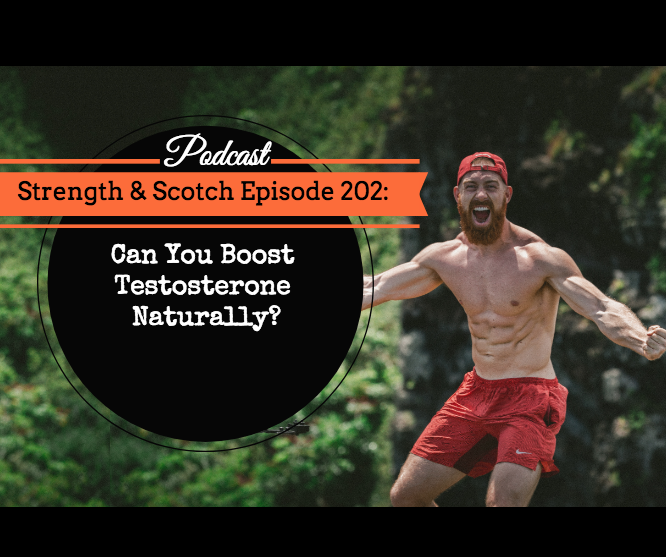SS 202 – Can You Boost Testosterone Naturally?
Episode 202 Show Notes
Grant and Heavey discuss a number of ways you can increase your testosterone levels outside of the illegal and doctor-prescribed stuff out there. Plus, did you know that the most expensive bottle of scotch sold at a whopping $1.1 million? Talk about investing in scotch!
[01:40] Are You Taking Vitamin D? (And Why You Probably Shouldn’t)
Grant talks about his recent thorough check up where they ran a Vitamin D test and found out he had low levels. He was instructed to start taking it as a supplement everyday. However, he found an article saying that millions of Americans who are taking Vitamin D must stop.
Apparently, the Vitamin D kick started off with Dr. Oz. He said something that got other drug companies involved. In fact, it’s currently the fifth biggest-selling drug, right after cholesterol medicine. Drug companies are currently pushing doctors and doctor groups to add it to people’s physical exams.
The primary reason people think it’s important is because of bone density. It’s so persuasive that over 40% of adults in the U.S. take Vitamin D supplements.
Meanwhile, a meta-study by Lancet Diabetes & Endocrinology looked at 81 randomized trials and they found there is “little to no justification for the use of Vitamin D supplements to maintain or improve musculoskeletal health.” The only exception is in rare cases wherein patients are at a high risk of or being treated for rickets and osteomalacia.
[06:25] Most Testosterone Boosting Drugs Are Crap!
Heavey explains that outside of illegal substances and those prescribed by doctors, there’s a huge market of products that are advertised to help boost testosterone levels. Though they are only second to fat burners, most of what is out there is garbage.
However, there are a handful of things you can do with certain supplements that may help if you want to boost your testosterone level.
[08:16] Increasing Testosterone Levels Through Lifestyle
Low levels of testosterone are associated with poorer health outcomes and depression. Type II diabetes and cardiovascular disease are strongly linked to decreased testosterone levels, so you can’t go wrong trying to naturally enhance it.
However, a lot of testosterone-boosting garbage is out there. Heavey wants to lay out a few effective approaches. Heavey begins by saying that the lifestyle piece is an important element of increasing testosterone outside of using illegal or doctor-prescribed substances.
First, a lack of sleep decreases testosterone production. Lifting not only raises testosterone after a workout, but also enhances long-term production. Fat gain has also been shown to decrease testosterone production.
Now, all these have to work together. For example, sleep not only enhances testosterone levels, but also helps prevent fat gain. As a result, it helps keep your testosterone levels healthy. Hence, sleep is a vital player in the pillars of health.
[12:20] Vitamin D (And Why You Should Probably Be Taking)
There are actually supplements that can increase testosterone levels. In fact, Vitamin D helps testosterone regulation in the body. Heavey mentions a study that showed low levels of Vitamin D are basically bad for testosterone levels.
Should you be taking Vitamin D then? It’s interesting how this actually contradicts to the article mentioned above (although it looked at its effect on musculoskeletal health).
Instead, perhaps spending 10-15 minutes in the sun can enhance your levels. That said, Heavey thinks it’s a relevant test for you to get on a regular basis. What you do about the results is what’s up in the air.
[16:30] More Zinc, More T
Zinc deficiency may impair your testosterone-production. However, zinc can be lost through sweat. Therefore, athletes may be more susceptible to zinc deficiency, which may apparently result in testosterone deficiency as well. Heavey recommends that zinc be tested among athletes on a regular basis.
You have to understand that long-term elevations in zinc levels can cause copper deficiency that could lead to health problems too.
Heavey understands that they usually run these tests out of pocket. Hence, he’d usually let them run through the same thing where he would have them do the lifestyle stuff or add a bit of zinc or magnesium supplementation. If the levels comes up in the test results and they want to continue supplements for an extended period of time, they might do some follow-up testing just to make sure they don’t get into trouble.
[20:06] Getting Help from Magnesium
Like zinc, magnesium supplementation is effective in certain individuals with both low testosterone and magnesium deficiencies. Also, note that magnesium comes in different formulations. Magnesium oxide, for instance, is not well absorbed and can lead to bowel problems. So you either try a different form or reduce the dose.
Again like zinc, you sweat out magnesium. Hence, this is something athletes should be aware of. Consider supplementing this if you’ve got low testosterone levels and see if it works.
[21:35] Other T-Boosting Supplements
The other two evidence-backed testosterone boosters are maca root and D-aspartic acid (D-AA). In fact, maca can improve libido but not due to a change in testosterone. While trials showed that D-AA supplementation increased testosterone levels, follow-up trials showed an actual decrease in testosterone levels. Heavey believes this remains equivocal at this point so it’s not what you want to consider taking. With that said, any supplement that says “testosterone booster” is probably something you don’t want to take.
[23:27] When to Get Doctor Prescription
Heavey points out that the ranges can be wide and some people may feel okay with having lower levels. It’s tough to know exactly when to get a prescription from your doctor. There is some individual differences to specify your need for an absolute level of testosterone. Nevertheless, regular testing of testosterone in males is valuable and there is a need for doctor prescription in some circumstances.
For some people, dialing lifestyle pieces may not be enough to move the needle for them. If this is the case, Heavey recommends you take those lifestyle pieces seriously, and if it doesn’t help then have a very serious conversation with your doctor about doing HRT or hormone replacement therapy.
[25:23] The Most Expensive Whisky of All Time
Grant shares an article about a record for the most money ever spent on a single bottle of scotch that was sold for $1.1 million. Grant thinks this is way too much money to spend on a bottle of scotch. And it’s a Macallan bottle!
The bottle was distilled in 1926 and aged. It was a 60-year bottle and only 12 were made. One bottle had been consumed, the other broken in an earthquake in Japan. So it’s possible 10 bottles still exist today. Each label was handcrafted by a famous pop artist Valerio Adami. They broke the record, which has previously been $1 million for a bottle of the same stuff sold a few years ago.
[27:55] Can Distilleries Still Age Their Scotch for Too Long?
Grant believes it’s harder for many distilleries now to age their stuff over a long time. Scotch went through a downturn really hard during the 80’s. The popularity of vodka took a hit on scotch, leading to a lot of distilleries losing their business.Tthey had a lot of inventory which they had to hold.
These days, there’s a wild swing in the other direction where scotch is becoming very popular again and most distilleries are doing all they can to keep up with the demand.
Grant and Heavey are currently enjoying a quarter cask bottle with no age statements. Grant explains how a lot of the scotch communities frown on this stuff. But he personally thinks this bottle goes for more money than the 10-year Laphroaig bottle. It could have some younger elements in 10 years, but it’s better.
Plus, it’s a smaller cask so the whiskey is exposed to greater surface area per fluid ounce, resulting in more flavor, faster. So it’s like an accelerated aging process.
[30:00] Whisky as an Investment
Ultimately, Grant stresses that it’s a lot harder for these companies to keep something for 60 years these days due to many factors – high demand, more expensive space, etc. Hence, these bottles are very expensive that people buy these as investments, like art. In fact, the Whiskey Advocate Magazine created a baseline on this because of it’s increasing value.
Links:
Article: Millions of Americans Take Vitamin D. Most Should Stop

Check out the gear page for everything Strength & Scotch! You’ll find a listing of all the supplements and other programs we’ve discussed on the show as well as our killer t-shirts!

